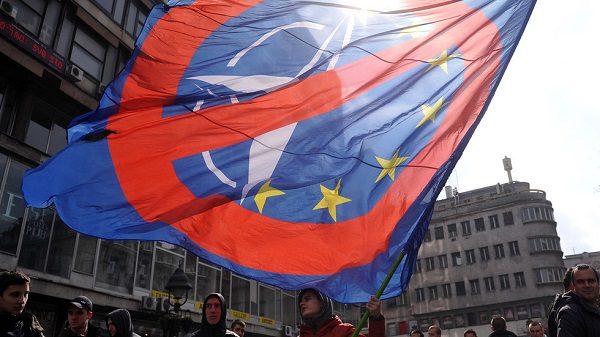Vulin sagde i lørdags at Belgrad har valgt at være militært neutral for al tid.
"Vi tog denne beslutning, fordi vi blev bombet, men først for fremmest fordi vi aldrig vil gøre mod noget andet land, hvad de gjorde imod os."
Kommentar: Denne artikel er delvis oversat til dansk af Sott.net fra: 20 years ago today, NATO began bombing a European country - 'This is why we will never join NATO,' says Serbian Defense Minister
On March 24, Serbia marks 20 years since the 1999 NATO bombing that saw hundreds of civilians killed and many more injured. Countless civilian structures across the country were left in ruins after the airstrikes.
"We won't be in NATO, I made it clear speaking to [Secretary General Jens] Stoltenberg," Serbian President Aleksandar Vucic said in a sit-down interview with Russia's Channel 1 on March 22. Serbia, which was the heartland of former Yugoslavia, "isn't something that you can break down or destroy," he said.
"Yes, we are ready to forgive but we will never forget."
The NATO bombing also polluted the land with depleted uranium. The toxic substance used for armor-piercing munitions is believed to be the cause of the spike in cancer cases today.
Serbian children below the age of 15 are diagnosed with cancer almost thrice as much as somewhere in Europe, Danica Grujicic, head of neuro-oncology at Serbia's Clinical Center, told RIA Novosti. "I started asking myself if we are doing something wrong," she said, "they have surgery as ever before, they get radiotherapy and die one year after."
"We can't rely on being reimbursed for our losses, nor can we expect a punishment of those who took part in this horrid crime," Vucic stated. "But the most important thing now is [to ensure] that this will not happen to us again."
Comment: Exactly. That's what tyrants are for; to teach us how to protect ourselves against them. See North Korea's nuclear weapons program, for example.
The bombings started following the incident in central Kosovo's village of Racak, an Albanian militants' stronghold. Serbs were blamed for slaughtering dozens of Albanian civilians on January 15, 1999. However, there were some doubts about the authenticity of the claims.
"This was a pure provocation to start the bombings," alleged Vladimir Chizhov, Russia's envoy in the EU. He suggested that the accusations could have been false and the bodies actually belonged to Albanian insurgents.




Kommentar: The 78-day illegal bombing campaign against Yugoslavia had no UN support. 15 tons of depleted uranium was used. The psychos called it Operation Noble Anvil, killed over 2,500 civilians, and devastated the country's highly developed civilian infrastructure.
The event is, arguably, what shocked Russia out of its slumber regarding Western intentions. By the end of the year, Putin was in power.
Watch the RT documentary 'Hellbent: 78 Days of Bombing Yugoslavia' to learn more.